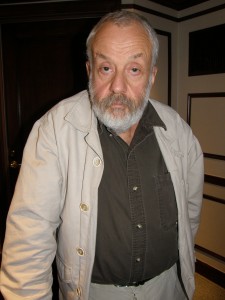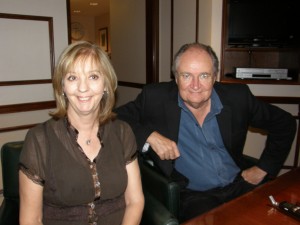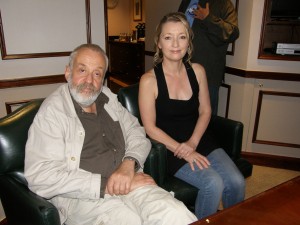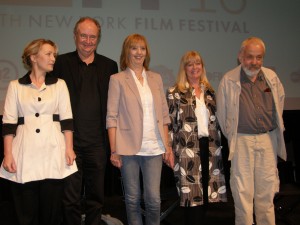
[This article originally appeared: http://www.tribecafilm.com/news-features/features/Mike_Leigh_is_Not_Going_Hollywood.html]
As “Another Year” is set to release in the States, the British director talks about hope, disappointment, and why he doesn’t think his films are “British.”
Mike Leigh has been directing films about workaday Brits for 40 years, and his latest, “Another Year”, is no exception. The story of happily married Tom and Gerri—portrayed by Leigh stalwarts Jim Broadbent and Ruth Sheen— doesn’t amount to a whole lot of action (as is par for Leigh’s course). Rather, the film is a collection of moments, many of which are shocking in both their simplicity and their humanity.
Leigh sat with us after a New York Film Festival screening this fall, a festival that has been home to a number of his premieres, including recent successes Happy-Go-Lucky and Vera Drake.
Tribeca: I know that you, Stephen Frears, and Ken Loach all came out of the same period at the BBC. And you’ve also done plays. Were you doing theater concurrently with teleplays?
Mike Leigh: I made my first feature, “Bleak Moments”, in 1971. I didn’t make another feature film for another 17 years: “High Hopes” in 1988. Those years [in between] were spent mostly making films for the BBC, with the exception of “Meantime”…
We were freelancers, Ken Loach, Frears and I. At the time we grumbled that we weren’t making feature films, but the truth is that it was a golden age. We had complete freedom. I mean, these were in-house productions shot on 16mm. They weren’t made to the highest motion picture standards, but they were films. But the great thing was you had carte blanche on what they were about—and you had an audience.
The films came under the banner of a series called Play for Today—an episode would go out every week at 9:25 after the news on Channel 1, and you’d get huge viewing figures. They were very political and very uncompromising; it was a great picture of society that a lot of people took part in creating.

In that period… there was no indigenous serious British cinema at all. It was all either very commercial, or the infrastructure of the industry was used by the Hollywood companies shooting cheaply in Europe. Then Channel 4 started, in the 80s; the reason for the fourth channel was to make independent programming—not in-house, but with independent producers. [This was] the thing we had been talking about for years [that] had always seemed like a pipe dream: films would be made on 35mm, they would have a theatrical life first and then be shown on television. That changed the landscape.
From that point onwards we all started to make films. I had already made “Meantime” for them a few years earlier, but then we made “High Hopes”.
Tribeca: A lot of filmmakers use action and story lines to build up to the denouement. You, on the other hand, create moments… the moment when that character realizes that perhaps everything is going to be all right or they experience some level of acceptance. It seems that a common thread in your films is that of disappointment.
Mike Leigh: Well, I think that may be true, but it’s important not to miss the dialectic. You can’t talk about disappointment without talking about hope. You start with Cyril and Shirley in “High Hopes”—the title even—they are actually quite positive. Of course, they’ve got their moments of doubt. They are actually antecedents of Tom and Gerri. And yet we know at the same time Cyril, from “High Hopes”, is also an antecedent of Johnny from “Naked”. And, indeed, even Johnny and Poppy [from “Happy-Go-Lucky”] have things in common, because both are idealists. The difference is that Johnny is a bitter and frustrated idealist, while Poppy is an idealist who will not allow herself to be embittered.
Tribeca: This tension between disappointment and hope that recurs in many films, do you feel compelled by it? It keeps coming up throughout your film.
Mike Leigh: I don’t think in those terms. I mean, of course I’m always aware, as any artist must be, of what [I’m] doing that may be repeating [my]self. So you’re careful to try and do something different. Each film is a stand-alone set of possibilities and predicaments in its own right. I mean, there’s a certain level at which they are all the same films. Jean Renoir famously said he just kept making the same film over and over. There’s a level where you can argue it’s all one long film, and every time you’re just seeing another episode. But on [another] level, they are very different from each other, these films. Within my own idiosyncratic genre, they are stylistically different.

Mike Leigh: The fact is, you have to have specificity. You have to know where you are. But I do not make films about England, about Englishness, or about English issues. That’s not what my films are about. Sometimes people have said my films are about class, but they’re not about class. They are about people. Class will crop up because (a) there’s class in all societies, and (b) you certainly can’t make an accurate or realistic film about the English society without it being rooted somewhere class-wise.
But—what is the subject matter of my films? Relationships, birth, death, work, love, trust, hope… It’s not that my films work in the States; they work everywhere. I think it’s because they deal with issues that are ultimately universal. Yeah, I shoot my films in London, because usually we can’t afford to go anywhere else. But the films are seldom about London.
Tribeca: Have you ever seriously considered bringing a character back into another film?
Mike Leigh: No. Each film is a metaphor contained within its frame. It’s a world we’ve created that exists then and there. I used to hope that my films would live beyond their initial release, and that they would still mean something to people years later; I think that aspiration has been fulfilled. To return to a character is pointless, apart from the fact that life is too short and I will never get around to doing all the things I want to. So why waste time trawling over ground you’ve already sewn and reaped? So, no interest.
Tribeca: You often cast the same actors over and over, yet it never feels like you’re re-creating something.
Mike Leigh: In “Another Year”, we’ve got a bunch of people I’ve worked with before. This is my ninth film with Lesley Manville. And the truth of the matter is that they are character actors. They are versatile, and the commitment is always to go somewhere they’ve never been before. So the fact that you’re hiring the same actors is a technicality.
There’s a moment… in “Another Year”, when [Lesley] is chatting up Joe in the back garden. Towards the end of that scene, you see a whole range of insecurities and hopes and disappointments and aging and regrets all happening at once. She’s fantastic at that. She’s creative in the moment when you’re shooting.
Tribeca: With each film, and through the rehearsal stage that you are so known for at this point, I suspect you arrive at places you weren’t expecting…
Mike Leigh: It’s an exploratory process. You start off with a notion or a feeling, a sense of the thing—but it’s hard to articulate what it was because it evolved into what is the film.
Tribeca: But you understand that for nine out of ten filmmakers one interviews, they’ve got the whole thing plotted out. They’re not going to encounter many surprises.
Mike Leigh: Nine out of ten? Ten out of ten!
Tribeca: Very possibly. Point is, when you do encounter a Mike Leigh, a director who is motivated by the exploratory process, you want to know what drives that.

Mike Leigh: It’s the only way I know how to make films. It seems like the only thing worth doing. My agent said to me, “If you want to make proper money, I can get you a film in Hollywood. Do you want to do that?” And the answer is, “No, I don’t want to do that.” And I’m never going to. Why? Because apart from everything else, I wouldn’t know how to do it properly. And the idea of knowing what it is before you ever start, quite apart from everybody else telling you what it should be and interfering with the damn thing—which no one does with my films; that’s the great thing about it—it would just be a nightmare. I don’t think I could ever go through with it. I’d make a mess of it.
But, I mean, it’s horses for courses. You do what you do and other people do brilliant films working in a conventional way. They deliver the goods because they know how to do it. Personally, I wouldn’t want to make the Bourne films, but they are brilliant, in terms of craft. I couldn’t do that. It’s academic, you know, because I do what I do and that’s the end of it.
Tribeca: Is there an advantage to being under the radar?
Mike Leigh: It isn’t easy. You can ask my actors and they’ll tell you, it’s tough.
Tribeca: What about it is tough?
Mike Leigh: Well, you can’t just tell them to learn the lines and then shoot it. There’s no cutting corners or shortcuts. You’ve got to go to the wire in every corner of it. So truthfulness is constantly on the rack.
Tribeca: It must be emotionally demanding.
Mike Leigh: It’s emotionally demanding and it’s time consuming. For every moment you see on the screen, there’s a huge amount of preparation, with all the lightness and freedom it apparently has. Months. The back story, the relationships—quite apart from the complexity of what’s happening in the moment in the scene. You’ve had whole days of improvisation of situations. And then we’ve deconstructed it and reconstructed it and rehearsed it though. We script it through rehearsal. Then getting it down for performance and refining it.
As taxing as it is, it’s immensely stimulating. And, at times, it’s great fun. The actors doing my film must have a good sense of humor. It’s very sophisticated and very ironic, but it’s for real and it’s tough and non-compromising. You don’t get nothing for nothing in this world.

